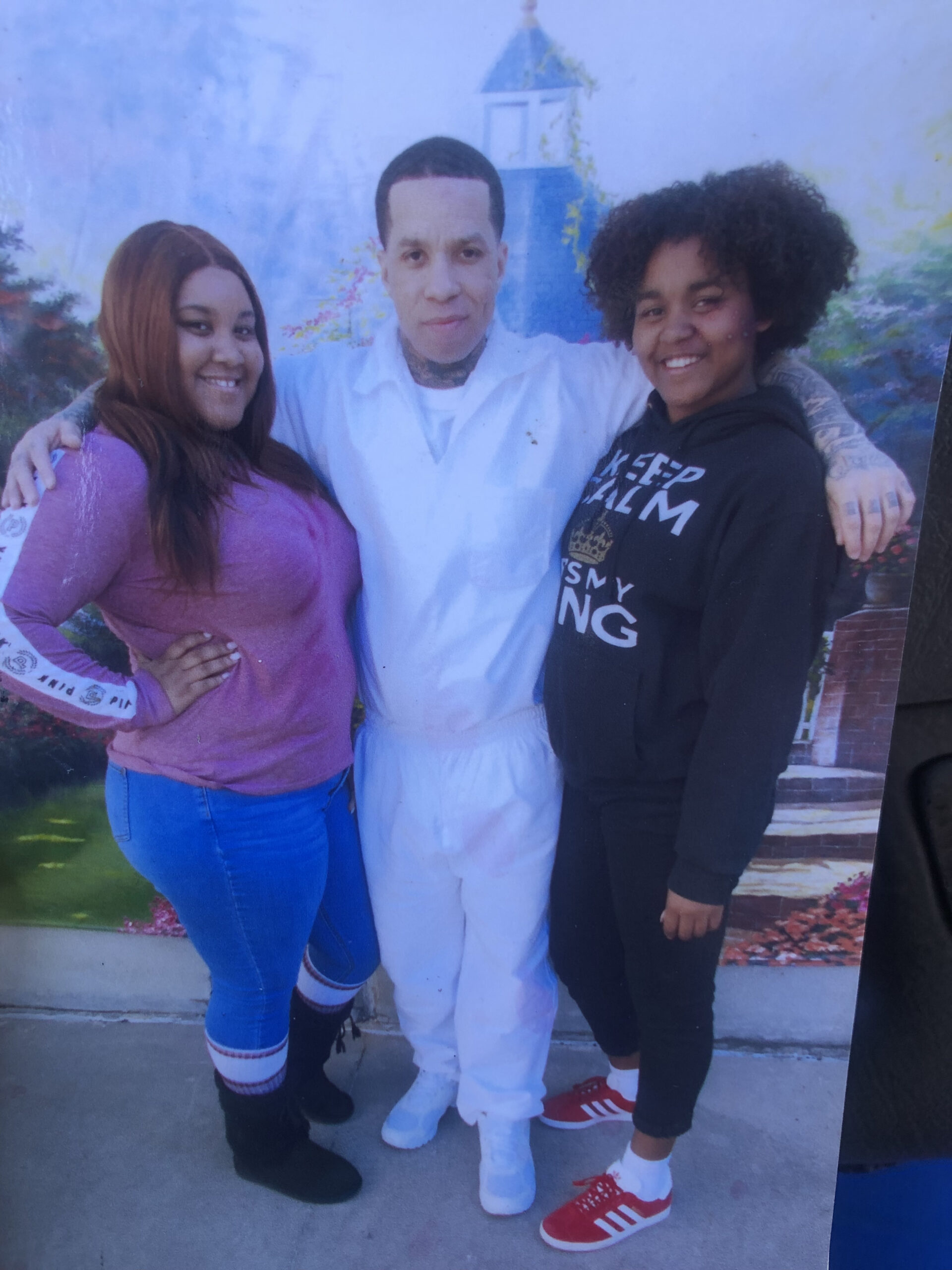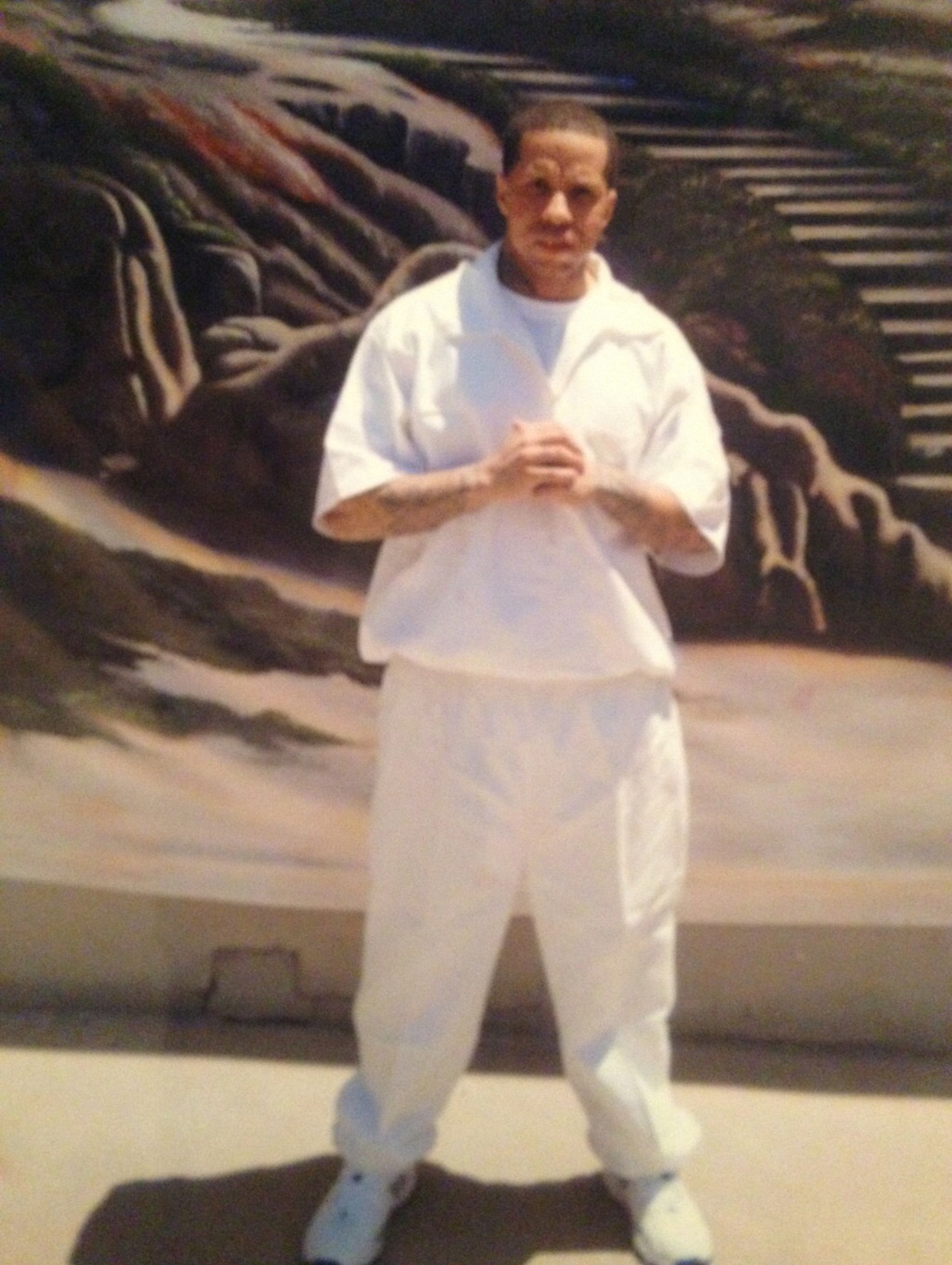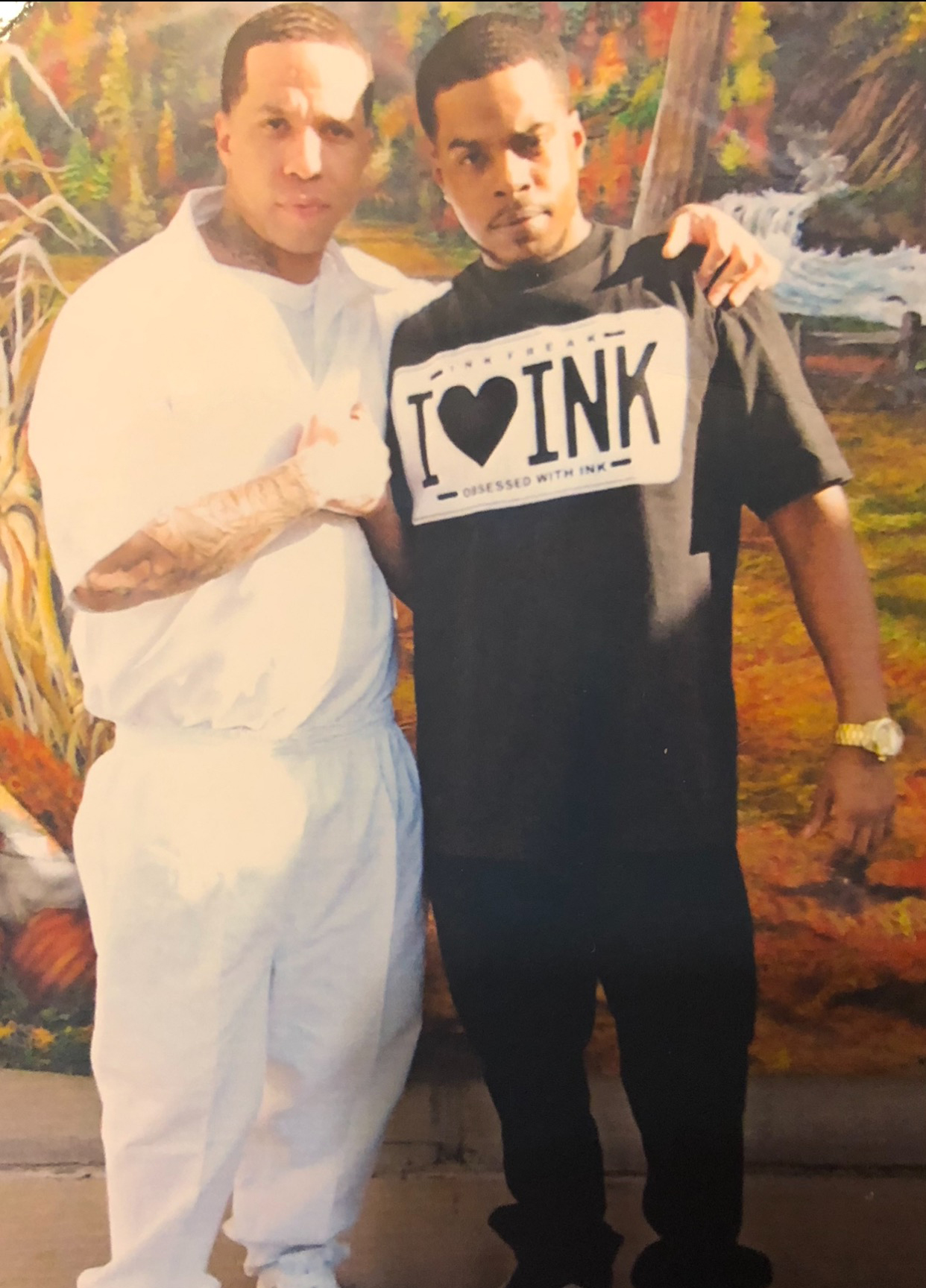The story of the conviction of Roderick M. Johnson...
The beginning of 1990, at the young age of 16 years old, Roderick was serving time as a youth offender program, when he was notified by his caseworker that she was contacted by Harris County homicide detectives informing her that they were planning to come and get Roderick and bring him back on a bench warrant to be charged with Capital Murder that he allegedly committed a year prior. This would be the first time Roderick heard of this case, but it would not be the last. As it turned out, detectives never came and brought Roderick back on a bench warrant and he was released in March of 2000. Strange as it may seem especially with this being an important issue, Roderick never heard anything from detectives upon release. Matter of fact, Roderick never heard nothing at all about the case until years later, when he found himself in trouble with the law again…
THE STORY
It was in 1998, Calvin Joyce was outside working on his car somewhere around 10:00 p.m. when he happened to notice two males and a female walk pass him. As these individuals rounded the corner, several minutes later, Mr. Joyce heard a gunshot coming from the direction that these individuals just headed to. Mr. Joyce immediately headed in the same direction that he heard the gunshot come from as he got closer, he noticed that someone had been shot and was still in their car. Noticing a police car across the street, he quickly got the officer’s attention and informed him of the situation. When asked by the officer if he saw anything, he simple stated that all he saw was two males run pass him in the opposite direction. Joyce also told the officer that he couldn’t make out any distinct description because it was dark, and everything happened so fast. When the paramedics and other officers arrived on the scene, the weather had worsened and turned into a heavy rain. Due to the condition of the weather no forensics or ballistics were performed and the victim’s vehicle was towed to a warehouse where it was stored for evidence. A few days later Ralph Saldivar, a fingerprint examiner for the Houston Police Department received a call from the victim’s family asking for his personal assistance with the case. Being that they shared mutual friends he agreed. So, with Mr. Saldivar’s assistance there were multiple fingerprints lifted from the victim’s vehicle. These prints were entered into the AFIAS system which is a national database for fingerprint. However, no match was found!
The Story Continued...
The year ended and as 1999 rolled around in, Jimmie Patton found himself sitting in Harris County Jail charged with two aggravated robbery charges. Through his father, Jimmie Patton contacted crime stoppers and said he had information about an unsolved murder case in exchange for some help with the charges that was facing him. When the detectives interviewed Jimmie Patton, he told the detectives that Roderick Johnson mentioned something to him about being involved in a murder. He (Jimmie Patton) gave the name Oswald McGlorie to the detectives as someone who may have more information. It was through McGlorie that the names of Leslie Lewis, Alton Dickie and a person by the alias of “Doughboy) would surface. In exchange for the information J. Patton’s bond was suddenly lowered and he made bail. Although Patton was later sentenced to 16 years for the two pending aggravated robbery charges. When detectives interviewed McGlorie who at the time was a minor and not in the company of a lawyer or parent/guardian he told detectives that Roderick and another guy by the name of “Doughboy” asked him to accompany them with a robbery in which he says he denied. McGlorie led detectives to an area near the crime scene where he says Roderick took him the next day to retrieve the guns with a guy by the name of Alton Dickie who was an older guy from the neighborhood. He also told the detectives that Roderick that Roderick and Doughboy might have ridden in a taxi to get back home that night. Leslie Lewis was the person that McGlorie told detectives that might have more information. When detectives interviewed Lewis, he told detectives that late the same night of the crime Roderick came to his house and said things went wrong with him and Doughboy and someone got shot. Next the detectives interviewed Dickie who told detectives that he did trade guns with a person by the name of “Lil Red”. Dickie admitted that days later he had a fight with Doughboy because he found out that Doughboy stole the guns from a neighbor’s home. Detectives tracked down a cab driver by the name of Laticia Farrell who recollected giving a taxi ride from an area near the crime scene to the Hiram Clarke area where both Roderick and Doughboy lived. She mentioned one passenger being lighter in skin complexion than the other who sat catacorner from her with whom she had a conservation with. Since both Roderick and Doughboy were suspects at this point and both had criminal records, she was shown a photospread containing their pictures. Ms. Farrell positively identified “Doughboy” to the detectives as being one of the passengers in her taxi that night. Roderick was never identified by Ms. Farrell.
Years later 2004….
Roderick was serving time on a 10 year non-violent sentence when Harris County homicide detectives showed up at the prison unit where he was being housed at, they arrested and charged him with Capital Murder. Roderick was brought back to Harris County jail to await trail. The next day after arriving back in Harris County jail, Roderick accompanied by his parents and lawyer went before a juvenile judge in what was called a certification hearing. All the evidence against Roderick in this case was presented before a judge in order to certify Roderick to stand trial as an adult. Although Roderick was now an adult, the crime occurred when he was a juvenile. At this hearing Detective Straughter names Patton, McGlorie, Lewis, Dickie along with Farrell, Joyce and Saldivar as the state’s witnesses. The judge approved of Roderick to stand trial as an adult and the case was sent to Harris County district court. For the next two years Roderick would sit in Harris County jail awaiting trial.
Demanding JusticeA CAMPAIGN FOR FREEDOM!!.



The Story Continued...Trial 2006
In April of 2006 trial began and every single witness that the state brought forth either recanted or revised their initial statements that they made prior to detectives.
Calvin Joyce: in his initial interview with the police on the night of the crime said that all he could recall seeing is two males run pass him in the opposite direction but couldn’t give a detailed description. When prosecutors questioned him on the witness stand nearly 10 years later, he revised his statement to staying that he saw two African Americans, one being lighter in skin complexion than the other that ran past him.
Laticia Farrell: in her initial interview with detectives said she remembered giving a taxi ride to two black passengers, both males, one being lighter in skin complexion than the other. She admitted to having the best view of the light skin passenger with whom she was having a conservation with. When shown a photo spread with both Roderick and Doughboy’s pictures, she positively id-d Doughboy and never identified Roderick as the other passenger. Nearly 10 years later after being shown the same exact photo as years before, Farrell revised her statement and testified that the picture of Roderick “looked like” the light skinned passenger in her taxi that night.
Jimmie Patton: recanted his entire initial statements he made to detective in which he implemented Roderick in this case. He testified that everything that he said in his initial interview was false and that he only said those things because he was seeking help with the two aggravated robbery charges that he was facing. He also testified that two weeks prior to his trial, prosecutor Ms. Thomas came to visit him in prison. She promised him that if he came to trail and said what needed to be said in order to secure a conviction on Roderick, she would write a letter on his behalf to help with his parole hearing, it was coming soon. Patton testified that all the information he initially gave to the detectives, came from what he heard on the news and rumors around the neighborhood.
Oswald McGlorie: recanted his entire initial statement about Roderick being involved in the crime and testified that what he told was based off being scared at the time. With no lawyer or parent present and being a minor, the detective were using McGlorie said he was forced to make those statements.
Leslie Lewis: recanted his initial statements claiming that Roderick admitted to any involvement in this case. Under cross examination, Lewis admitted that he initially told detectives that he did not know anything about the incident. During his reenactment one of the prosecutor’s yelled “you are aware that we have you on tape, correct?” Lewis then said, “If you play the tape, you will see how the detective kept stopping and starting the tape every time, I didn’t say what they were trying to make me say.” He testified that detectives held him for so long and with no lawyer or parent present he just said what they wanted him to say so he could leave. *No tape recording was ever played in open court before a jury or admitted as evidence.
Alton Dickie: recanted his initial statements that he made to the detectives implementing Roderick’s involvement with any guns. He testified that at the time of him giving those statements to detectives he had been drinking beer and smoking weed all day and by him being on parole at the time he didn’t want the detectives to report him to his parole officer and have him sent back to prison. Dickie testified that he knew Roderick from the neighborhood, that at no point did he ever trade guns with him.
Ralph Saldivar: testified that on the night of the crime no ballistics or forensics were performed due to heavy rain. Days later he admitted to lifting 7 fingerprints, 3 palm prints and 2 partial prints all in the same area of the vehicle. Mr. Saldivar stand all these prints except for the 2 partial prints were sufficient to find a match. The 2 partial prints were what he described as level 2 type prints, having a lot of twists and distortions, where many characteristics were out of place. He admitted that no other finger print examiner would test those type of prints because of the many distortions. Mr. Saldivar said this is when he matched a known print of Roderick to one of the 2 partials although these prints were not the best of quality. Later under cross examination Mr. Saldivar testified that the weather conditions such as rain would make it very hard to lift good prints from the vehicle, he stated that no other personnel was present with hm. He also testified that even with him matching one of the prints with a known print of Roderick’s “I can’t place Roderick on a crime scene.” Mr. Saldivar admitted that although all other prints were sufficient for a match, he never identified who the other prints belonged to.
Throughout the trial prosecutors were trying to paint a picture to the jury of Roderick being the “light skinned” suspect described in this crime by basing it on grounds of a faulty fingerprint procedure and hearsay statements. Prosecutors used suggestive in court identification procedures with witness Calvin Joyce and Laticia Farrell that seemingly complimented their revised statements making Roderick the person of interest. The state’s witnesses Patton, McGlorie, Lewis and Dickey all recanted their initial statements implementing Roderick in this crime. However, with inconsistent statements and inadequate evidence to prove Roderick guilty of ‘Capital Murder”, a jury found him guilty of a lesser charge of “Murder” and sentenced him to “Life” in prison. On Nov. 1, 2007 Roderick’s appeal was issued on April 23, 2008. In Feb of 2009, Roderick filed a Writ of Habeas Corpus (Article 11.07) with 10 grounds of merits for relief:
- Ineffective Assistance of Council, Jury Selection Process (failure to strike a bias juror)
- Counsel erred in not requesting the court to move for a new fingerprint analysis due to fingerprint examiner’s personal interest in case, which was a reflection of a conflict of interest.
- Counsel failed to object to inadmissible fingerprint evidence as being circumstantial evidence.
- Counsel performed incompetent trial strategy by not allowing applicant to take the stand to testify about the fingerprints, since the state was relying heavy on the fingerprints for the burden of proof to link applicant to a crime.
- Counsel failed to object to the admission of gruesome autopsy pictures shown which may have substantial effect on jury’s guilt or innocence or punishment determination.
- Counsel failed to investigate identification procedures used by law enforcement officials.
- Counsel failed to preserve errors.
- Ineffective Assistance of Appellate Counsel: Presented to the court of criminal appeals an issue different than what was objected to at trial.
- Abuse of discretion on the lower court by not properly instructing the jury to apply the law to the facts of the case.
- Abuse of discretion on the lower court by allowing hearsay testimony.
In March 2009, the trial court ordered Mr. Alvin Nunnery, Roderick’s trial counsel to file an affidavit within 45 days responding to the allegations in Roderick’s writ. Mr. Nunnery never responded. 10 years after filing several motions, including an evidentiary hearing seeking a response to the writ he filed, Roderick eventually filed a writ of Mandamus only to be denied. In Feb. of 2019 the Texas court of criminal appeals issued an order for the trial court to make findings regarding the allegations in the case. After 10 years of being unlawfully held in prison due to a violation of due process that’s guaranteed by the U.S. Constitution the Texas court of criminal appeals replied with a simple “denied without a written order.” They gave no explanation for denying Roderick’s writ. As it stands now, Roderick’s Federal Writ (2254) is currently pending in the United States District Court, Southern District of Texas.
Send Roderick a Message
If you would like to contact Roderick Johnson for more information or support him in his “Demand for Justice” you can do so by writing him at:
Roderick Johnson #1190123
PO Box 660400
Dallas TX 75266
If you send a letter through J.Pay.com please be sure to enclose a return address inside your letter if you would like a reply from Roderick
